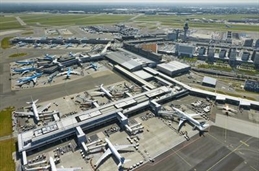
Amsterdam Airport Schiphol is expecting the pharmaceutical and high-tech verticals to lead future cargo growth as the hub focuses more on boosting air freight operations at the airport.
Europe’s 4th busiest cargo hub recorded increased cargo volumes at the peak of the pandemic — as countries scrambled to move life-saving personal protective supplies (PPEs) and other medical supplies as the world battled more than two years of the Covid-19 pandemic.
Schiphol’s total cargo volume reached 1.57 million tonnes in 2019 and 1.44 million tonnes in 2020 before recording a 15.7% year-on-year increase in air freight volumes for 2021, which reached 1.66 million tonnes.
Anne Marie van Hemert, head of aviation business development at Schiphol Airport, told Asia Cargo News at the sidelines of the TIACA Air Cargo Forum in Miami that Amsterdam Airport maintained flying during the pandemic — albeit at a smaller scale — but its cargo operations picked up due to increased demand.
“We’ve seen an enormous increase in tonnage during the pandemic,” van Hemert said. “[The boost] was mainly the PPEs, the vaccines, and the personal protection articles for hospitals and test facilities.”
“It was also people’s changed behaviour – because of the lockdown, people couldn’t shop, so ecommerce has had huge growth,” she added.
“You saw different types of goods being shipped, but mainly medication and Covid-related articles, but also ecommerce was skyrocketing,” she added, although noting that much like the rest of the world, the gateway has seen a drop in tonnage as of January this year but only a “slight decline.”
Van Hemert said several factors impacted the decline in cargo at Amsterdam, including the war in Ukraine, increased global economic uncertainties, labour issues and the persisting Covid-related lockdowns in China.
“The war in itself is disastrous, but what you see is that [it is affecting] not just Ukraine but also Russia, which means that a lot of airlines are not coming from the same route which they normally flew, so they need to use a different route which tends to be longer and more expensive,” van Hemert said. “So that’s related to the increase in cost. It makes it less favourable to continue flying to some destinations or to continue the number of flights per week, making it more challenging.”
The closure of European airspace to Russian aircraft and the U.S. ban on flying U.S.-origin aircraft forced AirBridgeCargo to stop operations.
AirBridgeCargo was Schiphol Airport’s biggest cargo client, according to van Hemert, and all the flights operated by the cargo airline subsidiary of the Russian Volga-Dnepr Group immediately disappeared when the war-related sanctions kicked in.
“AirBridgeCargo [was] the biggest cargo client for us and for that specific market. In the beginning, we thought we could continue operating, but again that was a huge blow for us,” van Hemert said.
“China is still not available – we’re waiting to have it reopen again,” she said. “It’s a huge market for Amsterdam, so we’re really hoping it opens up any time soon – hopefully in 2023 – and that we can continue business again.”
In 2021, the airport’s top three destinations for cargo by tonnage were Shanghai, Chicago and Dubai.
Schiphol will focus on further growing its pharmaceutical and high-tech verticals in its air cargo business.
“Pharma is really important to us – it already is – but we needed to re-emphasize that and start investing in that again,” van Hemert said, adding that the airport put up a small team to investigate and confirm what exactly needs to be done to ensure the growth of pharma in its operations.
“Ideally, at the end of the year, we would like to see an increase in high-tech and pharma, and we would like to have it secured and be appealing as a station where they would like to send the goods through because it’s safe because it’s digital and new and innovative,” she said, noting that pharma is an excellent segment to develop due to Schiphol’s proximity to many pharma-related companies.
“We have a lot of pharma-related companies in our neighbourhood; it would be a shame not to accommodate that better,” van Hemert said.
“Looking forward to the future, high-tech is a high-yield product, and it needs to be handled with care. We’d like to differentiate ourselves as a station to accommodate that type of product in Amsterdam.”
Currently, the biggest challenge for the airport is the labour market, the proposed flight reductions by the Netherlands government, and the ongoing Russia-Ukraine war, further compounded by the closure of China.
“The biggest challenge is the labour market – that’s not just us; it’s a global challenge. We must put in the best effort we can [to recruit more people back]. Still, we also have to start thinking about working differently,” van Hemert said, pointing to the digitization of some repetitive processes at the airport.
Nonetheless, she noted that the impact is largely on passenger operations rather than cargo.
Looking ahead, van Hemert said that the “most ideal” situation for the airport is the Russia-Ukraine war ending and the China market reopening its borders.
“The complete normalization for us is if China opens again, and if the war ends and then, there’s a wide and open network again that you can rebuild again, that would be the most perfect situation in all areas,” she added.
“In the meantime, before we get to that moment, we need to optimize certain things that will help us work smarter, in a different way; focus on these two streams – high tech and pharma – and to make sure that we attract the right parties that could add something to our network,” van Hemert added.



